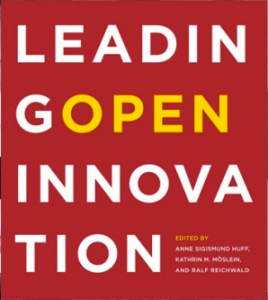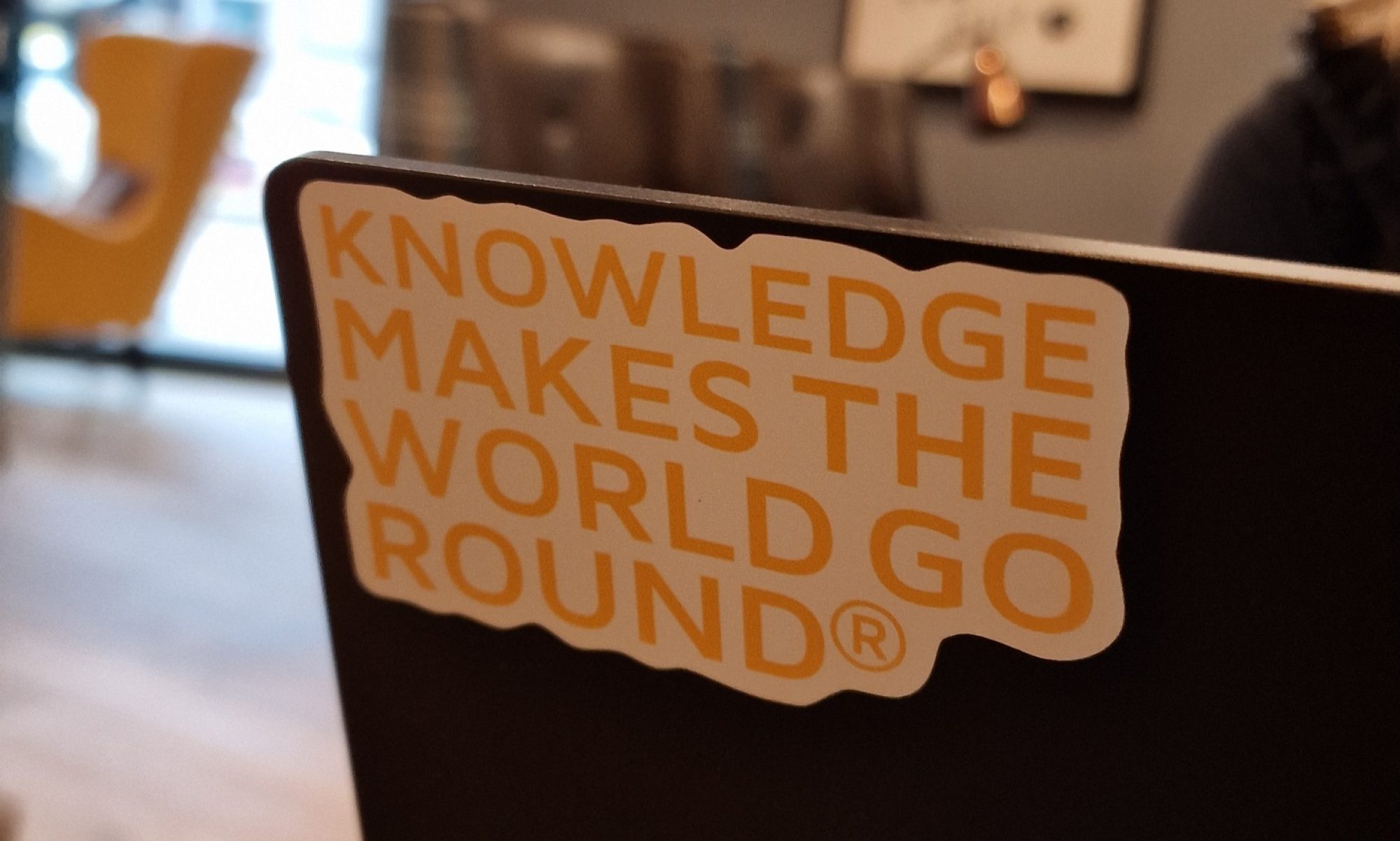 Das Buch unterscheidet sich von anderen durch die vielfältigen Perspektiven auf das Thema. “The book Leading Open Innovation describes OI’s search for smart people who might expand the space for innovation. It reflects international, cross-sector, and transdisciplinary interests among contributors from the United States, Germany, France, Finland, the United Kingdom, Portugal, Tunisia, Austria, and China working in large multinational organizations, academic institutions, or entrepreneurial projects. They are part of the Peter Pribilla network, which Ralf Reichwald describes at the end of the volume as a point of contact that supports overlapping interests in innovation and leadership.”
Das Buch unterscheidet sich von anderen durch die vielfältigen Perspektiven auf das Thema. “The book Leading Open Innovation describes OI’s search for smart people who might expand the space for innovation. It reflects international, cross-sector, and transdisciplinary interests among contributors from the United States, Germany, France, Finland, the United Kingdom, Portugal, Tunisia, Austria, and China working in large multinational organizations, academic institutions, or entrepreneurial projects. They are part of the Peter Pribilla network, which Ralf Reichwald describes at the end of the volume as a point of contact that supports overlapping interests in innovation and leadership.”
Goleman, D.; Boyatzis, R. (2008): Social Intelligence and the Biology of Leadership
 Der Artikel Goleman, D.; Boyatzis, R. (2008): Social Intelligence and the Biology of Leadership (Harvard Business Review, September 2008) befasst sich mit Sozialer Intelligenz von Führungskräften und bezieht sich dabei deutlich auf die von Goleman schon lange vertretene These, dass die Emotionale Intelligenz im Geschäftsleben (für Führungskräfte) wichtig ist. Der Artikel ist ohne weitere Quellenangaben eher eine Beschreibung der Situation, dass der Homo Oeconomicus und damit auch der “Manager Oeconomicus” [eigene Wortschöpfung] nicht mehr zeitgemäß sind. Was fehlt ist der Hinweis, dass die Emotionale Intelligenz bzw. die Soziale Intelligenz und auch andere Intelligenzen (inkl. des IQ) Bestandteile der Multiple Intelligenzen Theorie sind, die Howard Gardner seit 1983 vertritt. Mit Emotionaler (Sozialer) Intelligenz alleine kommt man im Geschäftsleben auch nicht voran. Darüber hinaus ist auch zu klären, ob die beschriebenen Phänomene auf die Soziale Intelligenz der Personen zurückzuführen sind, denn dann wäre es eine Ursache-Wirkung-Beziehung, die z.B. Neuweg (2004) als Intellektualistische Legende kritisiert… Neuweg bezieht sich dabei auf Ryle und vertritt die Ansicht, dass sich die Intelligenz selbst in der Handlung zeigt… In meinem Promotionsvorhaben gehe ich u.a. diesen Fragen nach. Natürlich können Sie sich auch einige meiner Veröffentlichungen dazu ansehen.
Der Artikel Goleman, D.; Boyatzis, R. (2008): Social Intelligence and the Biology of Leadership (Harvard Business Review, September 2008) befasst sich mit Sozialer Intelligenz von Führungskräften und bezieht sich dabei deutlich auf die von Goleman schon lange vertretene These, dass die Emotionale Intelligenz im Geschäftsleben (für Führungskräfte) wichtig ist. Der Artikel ist ohne weitere Quellenangaben eher eine Beschreibung der Situation, dass der Homo Oeconomicus und damit auch der “Manager Oeconomicus” [eigene Wortschöpfung] nicht mehr zeitgemäß sind. Was fehlt ist der Hinweis, dass die Emotionale Intelligenz bzw. die Soziale Intelligenz und auch andere Intelligenzen (inkl. des IQ) Bestandteile der Multiple Intelligenzen Theorie sind, die Howard Gardner seit 1983 vertritt. Mit Emotionaler (Sozialer) Intelligenz alleine kommt man im Geschäftsleben auch nicht voran. Darüber hinaus ist auch zu klären, ob die beschriebenen Phänomene auf die Soziale Intelligenz der Personen zurückzuführen sind, denn dann wäre es eine Ursache-Wirkung-Beziehung, die z.B. Neuweg (2004) als Intellektualistische Legende kritisiert… Neuweg bezieht sich dabei auf Ryle und vertritt die Ansicht, dass sich die Intelligenz selbst in der Handlung zeigt… In meinem Promotionsvorhaben gehe ich u.a. diesen Fragen nach. Natürlich können Sie sich auch einige meiner Veröffentlichungen dazu ansehen.
Multiple Intelligences and Leadership
 In dem Paper Thatcher, A.; James, J.; Todd, A. (2005): Multiple Intelligences: Imagetic Scenarios in the communication of leadership vision (Proceedings of CybErg2005) stellen die Autoren den Zusammehnag von Multiple Intelligenzen Theorie und Leadership dar (Seite 3): “In the Theory of Multiple Intelligences, defended by Gardner (1994), there is direct relationship between Leadership and Intelligence. The author states that leadership is the process that occurs inside the minds of an individual who lives within a certain culture. Gardner (2000) identified the four types of multiple intelligences that enhance leadership development. According to his model, leadership requires abilities in the intra-personal, inter-personal, linguistic and existential areas at different levels. So, it is important to evaluate the unique combination of abilities that can direct someone to a particular vocational post, says Gardner (1996). The consequence of verifying and analyzing these combinations and the level of intelligence of the most recognized leaders is an organization that is also intelligent. It was within this perspective that Carvalho (2003) identified the conceptual relation between leadership vision and multiple intelligences.” Es wäre daher angemessen, wenn sich Führungskräfte stärker mit der Multiple Intelligenzen Theorie befassen würden …
In dem Paper Thatcher, A.; James, J.; Todd, A. (2005): Multiple Intelligences: Imagetic Scenarios in the communication of leadership vision (Proceedings of CybErg2005) stellen die Autoren den Zusammehnag von Multiple Intelligenzen Theorie und Leadership dar (Seite 3): “In the Theory of Multiple Intelligences, defended by Gardner (1994), there is direct relationship between Leadership and Intelligence. The author states that leadership is the process that occurs inside the minds of an individual who lives within a certain culture. Gardner (2000) identified the four types of multiple intelligences that enhance leadership development. According to his model, leadership requires abilities in the intra-personal, inter-personal, linguistic and existential areas at different levels. So, it is important to evaluate the unique combination of abilities that can direct someone to a particular vocational post, says Gardner (1996). The consequence of verifying and analyzing these combinations and the level of intelligence of the most recognized leaders is an organization that is also intelligent. It was within this perspective that Carvalho (2003) identified the conceptual relation between leadership vision and multiple intelligences.” Es wäre daher angemessen, wenn sich Führungskräfte stärker mit der Multiple Intelligenzen Theorie befassen würden …
